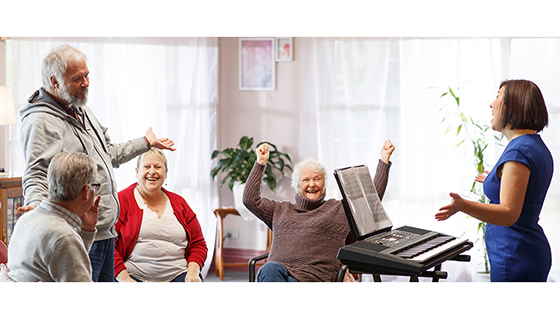Research team harnesses power of music for dementia
A research team at the University of Melbourne has successfully trialled a music therapy program that can impact how people living with dementia are cared for at home.
 Led by Professor Felicity Baker, a team within the Faculty of Fine Arts and Music has been studying the effects of music to alleviate the distressing behavioural and emotional symptoms of dementia.
Led by Professor Felicity Baker, a team within the Faculty of Fine Arts and Music has been studying the effects of music to alleviate the distressing behavioural and emotional symptoms of dementia.
They have collected evidence demonstrating that where drugs fail to provide a cure, music has the unique power to increase mood, provide mental stimulation and reduce behavioural disturbances.
“Dementia is a thief. We have a responsibility to manage the health of people with dementia and the depression often associated with it without defaulting to medication,” says Professor Baker, who is also the University’s Head of Music Therapy.
Dementia is a chronic health condition that affects 50 million people worldwide – a number expected to rise to 130 million by 2050. The majority of people with dementia are being cared for at home by their loved ones. While this helps reduce the financial burden on the family, it comes at a heavy cost to the wellbeing of the carer.
Through a face-to-face pilot study, Professor Baker and her team have been training family carers on how to use music appropriately in day-to-day care. They found that once carers are taught how to use music strategically to care for their loved one, they are able to implement treatment at home. The benefits are experienced by both the person with dementia, as well as the carer.
The team wants to use this evidence to expand the reach of music therapy to homes across the globe.
“I am leading an international team of music therapy researchers to scale up this study across five countries,” says Professor Baker. “Called Homeside, this study aims to make music intervention programs available around the world by 2023.”
The team is working to develop an app, which carers can access from a mobile device to get training on the use of music therapy at home. The app will utilise video and interactive decision-making tools to upskill caregivers in using music to strategically modify distressing behaviours.
Professor Baker is also working with colleagues across the University, bringing together experts from the creative arts, health disciplines and economics fields.
“This partnership across disciplines is allowing us to apply knowledge and innovation to benefit vulnerable members of our communities. We are all committed to deliver this work and make a difference in people’s lives.”
Find out more and listen to the latest Eavesdrop on Experts podcast with Professor Baker.